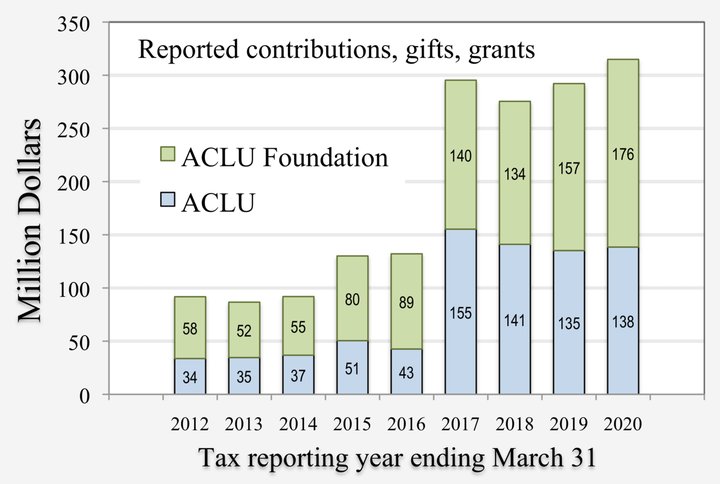If you were around during the lead up to the 1988 election when vice-president George Bush defeated Michael Dukakis, you may recall the “card-carrying member of the ACLU” taunt that Bush repeatedly used against his opponent. He was, of course, piggy-backing on the old Joe McCarthy slur, who claimed during the Second Red Scare (1947-1957) that there were 57 “card-carrying Communists” working for the US Department of State. (The claim, widely reported, was unfounded, along with much of what the Senator said.)
At the time, I’d been an enthusiastic member of the ACLU for several years, but Bush’s “accusation” was all I needed to make sure I kept my membership card in my wallet, so I could join the worthy group being maligned by Bush. Although he ultimately won the election, Bush’s anti-ACLU tactics backfired, as membership grew in the wake of his claim. (Today, the ACLU comprises 1.7 million members, 500 staff attorneys and thousands of pro bono attorneys.)
It’s pretty easy to fault the organization, which has tried to stay true to its original, 1920, goal: “To defend and preserve the individual rights and liberties guaranteed to every person in this country by the Constitution and laws of the United States.” Although for Bush, and probably most Americans, the ACLU is a left-wing organization, it’s lost members over such controversial stances as its defense of: a neo-Nazi group in 1978 who wanted to march through a suburb of Chicago, Skokie, where many Holocaust survivors lived; “Ollie” North during the Iran-Contra affair (—North facilitated illegal weapons sales to Iran to fund Nicaraguan Contra guerrillas, but his trial relied on coerced testimony); and more recently, Georgia’s Ku Klux Klan, after the organization was rejected from the state’s “Adopt-a-Highway” program.
ACLU membership jumped and contributions increased following Trump’s 2017 executive order barring millions of refugees and citizens of seven Muslim-majority countries.
So yeah, the ACLU has taken positions which are hardly in line with its liberal reputation. I remember back in the 1980s, when I lived in Bellingham, WA, a group of us Nuclear Freeze activists met with a couple of ACLU legal officials from the Washington regional office. Someone—I think it was me—naively asked whether the stances taken by the ACLU were pretty cut-and-dried, that an issue was either obviously one the ACLU would defend or not. They two attorneys burst into laughter. “As if!” they said, adding that board members debated and argued every potential stance—even the ones that looked like no-brainers—until a hard-won consensus prevailed. Naive, as I say.
I was reminded of that meeting watching a video of two ACLU representatives discussing the topic of transgender rights, leading in with the statement, “Anti-LGBTQ lawmakers across the country are attacking our trans communities right now – overwhelmingly through cruel bills that target trans youth and their rights to healthcare and to play sports.” A question came up, What happens when “men are allowed to play on women’s teams”? The ACLU lawyer responded, “Good news. Men aren’t playing on women’s teams. Trans women are women.”
Which sent me to my go-to first reference, Wikipedia, since I wanted to know, What’s the definition of a trans woman? This should be easy, I thought (—I’m still that naive). A trans woman is a woman who was assigned male at birth, begins the entry on “Trans woman.” That settles it, right?
Except…here’s a person, say 14 years old in the thick of puberty, who fits the biological definition of “male,” having one X and one Y chromosome, with all the regular male genitalia, who announces to his parents or school counselor that “he” is a girl. My heart goes out to this individual (remembering my own emotional roller coaster during that phase of my life). Still, does someone’s self-definition make it so in society? Would the ACLU’s stance on gender rights mean that the organization would support this individual in transitioning, perhaps with hormone treatments and surgery?
My confusion only deepened when I went to Wikipedia’s “Talk” discussion on their “Trans woman” page. I’ve just spent the last hour or so—really, it’s that long—reading it. To get to the start of that simple, unequivocal statement, “A trans woman is a woman…” the (unpaid) Wikipedia editors and contributors have gone through hell and back again. (My heart’s with them, too.) As I say, I’m more confused than ever, glad that I’m not an ACLU attorney.
Fortunately, I have you, um, guys, out there to enlighten me. TIA!

CLICK TO MANAGE